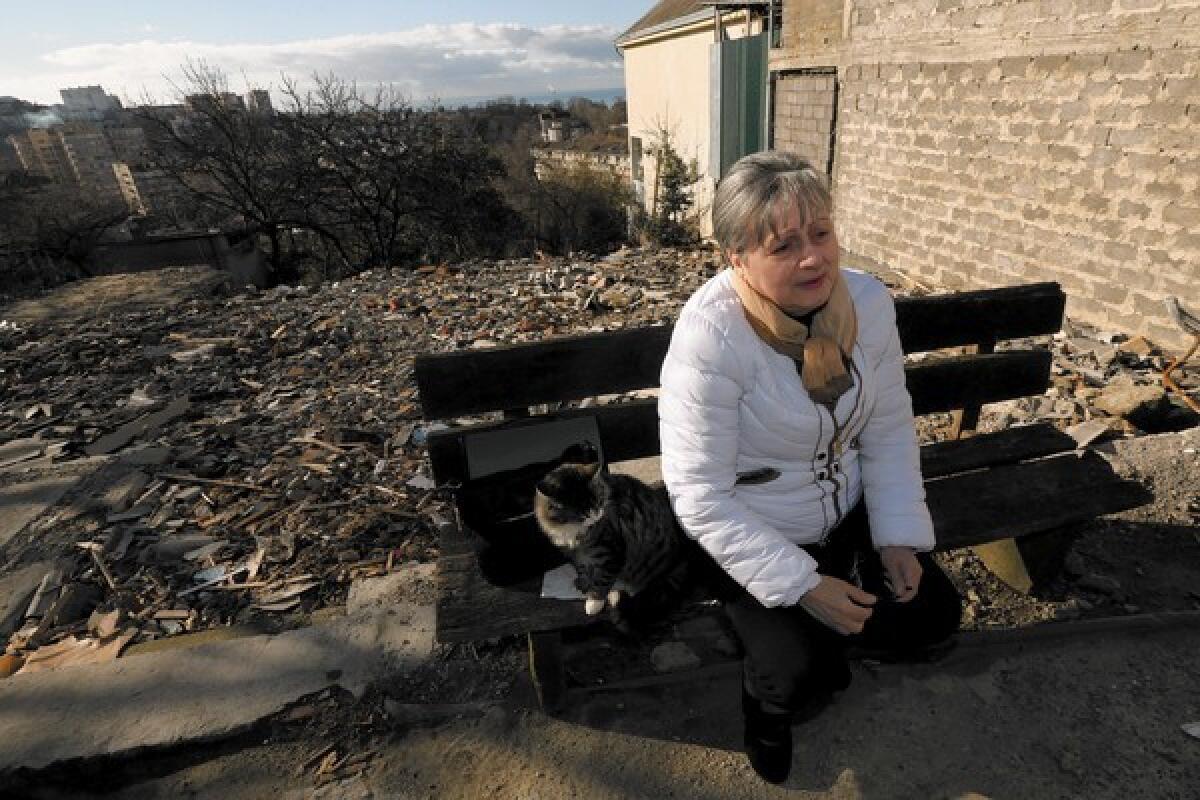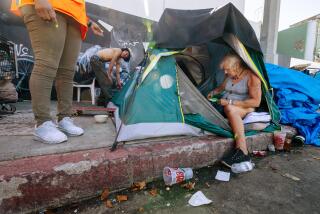Sochi Olympic Winter Games at root of residents’ housing woes

- Share via
SOCHI, Russia — Half a mile away, thousands of people waved flags, held balloons and cheered Thursday as the Olympic torch passed by. Nina Toromonyan stood in the gray rubble that remains of her home and cried.
She recalled her elation in 2007 when her city was selected to host this year’s Olympic Winter Games. She imagined that wonderful things were coming. She didn’t think that riot police would throw 13 family members out of their three-story home to make way for a new highway two miles away. The compensation they received wasn’t enough to reestablish themselves, she said.
“There is nothing I hate so much as these Olympic Games, which made me and my family a miserable bunch of bums,” said the small, frail 63-year-old.
Yuri Maryan, head of Sochi’s nongovernmental anti-corruption coalition, said dozens of people suffered similar fates in the years leading to the Olympics, which open Friday. Legislation known as Law 301 allowed the seizure and demolition of privately owned plots of land and buildings in preparation for the Games. It never took into account the consequences for people living in Sochi, he said.
“It was a very Soviet way of doing things: anything for a noble purpose,” Maryan said. “Given the ample corruption around this theme, the project became a disaster for many families.”
Toromonyan said the police showed up Oct. 23 wearing black masks and armed with Kalashnikovs and clubs. They pushed and kicked everybody out of the house at gunpoint.
One officer dragged Toromonyan’s older sister by the hair as she kicked and wailed. Toromonyan’s 63-year-old husband, Karapet, tried to intervene but was clubbed and forced to the ground, she said. One of the frightened grandchildren, 9-year-old Grisha, pleaded with the policemen: “Please, don’t shoot, don’t kill us.” His mother tried to calm him, saying it was just a movie being shot and no one would get hurt.
Toromonyan had lived in the house since 1970, when she married Karapet. She still carries a yellowish piece of paper with a stamp indicating the property, slightly more than half an acre, was given to her father-in-law to honor his bravery in the army in World War II. She said she had shown the paper repeatedly to bureaucrats and judges, but to them it was worthless.
Officials and judges decided that in accordance with Law 301 the house and the land were in the way of the new Sochi-Adler highway. Adler is the site of Olympic venues. It did not matter that the highway had already been built before the house was demolished, passing a good two miles from the house.
Officials saw no violation of the law in Toromonyan’s case.
“In accordance with that law we have relocated more than 1,000 people and we paid good compensation or offered them other housing,” said Sergei Somko, deputy chief of the Olympics department of the Krasnodar regional administration. “Very few people complained, and when they did it was up to courts to decide what should be done. Those houses that were initially built with violations, or illegally, were not entitled to compensations.”
Toromonyan has no proof, but thinks that someone with good connections will swoop in and buy the plot of land.
The three families, including four children, who make up the Toromonyan clan received the equivalent of $152,000 in compensation. They divided it equally but couldn’t buy a house for any of the families, who now are renting cheap apartments in Sochi. Toromonyan, her husband, their daughter and granddaughter are renting two rooms in an unfinished house down the hill.
Toromonyan comes to the ruins every day to feed the family’s dogs and cats, which are still there. As are the two houses flanking hers; officials said those were not in the way.
Angela Zilberg, a 42-year-old real estate developer, said she also got in the way of the Olympic juggernaut. Two apartment houses she built in central Sochi with the funds of more than two dozen families who lived in them were demolished in October because they did not fit the new image of Sochi, she said. Officials said that both structures, built in 2010, had code violations.
The police and demolition teams arrived in the middle of the day and in a pouring rain threw all the furniture they could out of the houses without waiting through an appeal period, Zilberg said.
“When I met personally with the judge a few days later, he told me privately, ‘They would have rolled me into concrete and asphalt if I had ruled in your favor,’” Zilberg said. “I was initially so naive as I had all my documents in order and couldn’t believe they would do this with new houses. But they falsified some documents in court.”
Zilberg and her tenants never received any compensation. More than that, she was ordered to pay a $100,000 fee per apartment house for demolition. She has refused to pay.
The Olympic torch relay that attracted so many people Thursday circled the streets of Sochi but avoided Poselkovaya Street, which for the last three years was popular with trucks delivering supplies for the highway construction. The activity eventually made the street impassable.
Neighbors say Irina Berezina, 42, fell into a mud pit on the road and died last May before an ambulance could get to her. Her grief-stricken husband died three months later, they said.
Poselkovaya Street remains dangerous.
Ulyana Goretskaya, 27, said doctors wouldn’t brave the street to reach her sick child last week. “So we had to carry her to the hospital in our arms over these slippery and treacherous boards underfoot,” she said. “What if there is a fire? No one will save us then! And the builders are in no hurry to repair our street.”
People are not the only ones suffering. Stray dogs reportedly have been mercilessly exterminated.
“Games or no Games, we have to keep stray dogs under control,” said Alexei Sorokin, head of a regional pest control company.
Witnesses say animal control workers not only shot the animals but also poisoned them.
“The authorities are trying to resolve by the most brutal methods the problem of stray dog overpopulation in the area,” said Nadezhda Mayboroda, who runs a dog shelter that opened two weeks ago outside Sochi, a long distance from the Olympic Park. She said the poison affects the dogs’ ability to breathe, and they suffocate.
Of the more than 100 dogs in the shelter, about 60 have been brought by volunteers from the Olympic Village in the last two days, she said.
“Our shelter will not save all of them, as the state needs to devise a whole new strategy about them,” Mayboroda said, “But the state has other more important issues on the agenda now, as you know.”
More to Read
Sign up for Essential California
The most important California stories and recommendations in your inbox every morning.
You may occasionally receive promotional content from the Los Angeles Times.













